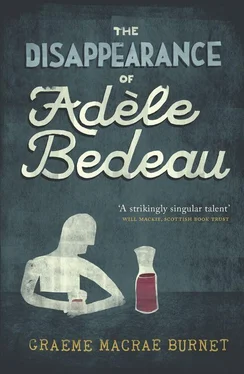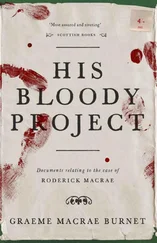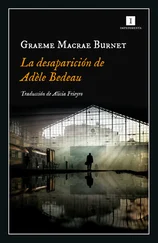At the bank, Manfred felt the effect of the extra glass of wine. He caught himself dozing off at his desk and buzzed his secretary to bring him coffee. He saw a farmer named Distain about extending the grace period of a loan. Manfred half-listened for fifteen minutes as the hoary farmer droned on about pressure from the supermarkets, the inequities of common market regulations and the threat to the French way of life. Glancing at his file, Manfred could see that the farm had been losing money for a decade. He granted Distain a repayment holiday of three years, the maximum possible. Distain could barely contain himself. For a terrible moment Manfred thought that the man was going to weep tears of gratitude. As he ushered him out of his office, Manfred had to physically wrench his hand from his grip.
Manfred dreaded Thursday nights. He arrived at the Restaurant de la Cloche at the usual time and took his place at the counter. He ordered his first glass of wine and downed it swiftly. Lemerre and Cloutier were at their table. Petit was late. In the mirror behind the counter Manfred saw Lemerre take out the cards and absent-mindedly shuffle them. Petit arrived, took off his jacket and hung it over the back of his chair. Lemerre and Cloutier were already two-thirds through the first carafe of the evening. The three men talked in low voices for some minutes, before Lemerre (it was always Lemerre) shouted across the bar, ‘Swiss, are you making up our four tonight?’
Manfred always waited to be summoned in this way. There was no reason why he should not join the men at their table when he arrived, but he never did. Instead, because he keenly felt the absurdity of the charade being enacted, when Lemerre called him over, he adopted an expression of surprise, as if the fact that this was the evening of the card game had slipped his mind.
Manfred obediently took his glass to the table and sat down. The three friends invariably sat in the same seats, obliging Manfred to take what he thought of as the dead man’s chair. There could be no discussion of who would partner whom, since any change would necessitate swapping places. Thus Manfred played with Cloutier, and Lemerre played with Petit. Cloutier was a rotten player, unable to read Manfred’s bids and timid in his play. Lemerre and Petit engaged in a system of ill-concealed cheats: scratching their noses, coughing and tapping the table. So transparent was their primitive code that it worked in Manfred’s favour. They might as well have laid their cards on the table for him to see. Despite the fact that Cloutier played like a half-wit, they invariably won. Once, Lemerre had even accused Manfred of cheating. More often Lemerre and Petit simply shook their heads at their opponents’ good fortune.
Adèle brought a fresh carafe of wine and a glass for Manfred. As she bent over the table Manfred stole a glance at her cleavage and thought of the young man he had seen the previous night.
On Thursdays, four carafes were drunk. Manfred ensured that his consumption of wine kept pace with the others so that he could be accused neither of drinking more than his share nor of lagging behind. At the end of the evening Manfred’s contribution to the tab would be pocketed by Lemerre. The three men settled their bill on a weekly basis. Manfred could certainly have made a similar arrangement with Pasteur and bring an end to the embarrassing tipping ritual, but he had never requested a tab and to do so after so many years would seem odd. ‘Why,’ Pasteur would surely ask, ‘have you never asked for one before?’ Manfred would have difficulty answering such a question. He could hardly claim that it never crossed his mind. He thought about it on a daily basis.
Lemerre drew up the score sheet on the back of an envelope. Since the death of Le Fevre, Lemerre had become the de facto leader of the group. He smelt of a mixture of hair products and sweat. His jowly face wore a permanent expression of scorn and he could often be heard loudly decrying immigrants, Jews (whom he blamed for the majority of the world’s problems) and, a favourite bugbear, homosexuals. ‘Your lot,’ he liked to tell Manfred, ‘have the right idea, Swiss. Keep the Turks and Jews out.’ His tirades were delivered in a vaguely effeminate manner, accompanied by elaborate hand gestures, which seemed to suggest that he was sprinkling gems of wisdom among his acolytes. The effect was both comic and menacing. On occasion Manfred had allowed himself to be goaded into debate with Lemerre, which only led to being denounced as a communist queer. Now he left it to Pasteur to intervene when Lemerre’s diatribes got out of hand.
The cards were cut and dealt. Lemerre and Petit engaged an elaborate exchange of coughs and table-taps from which Manfred inferred that they were both weak in spades. He was long-suited in spades and deduced that Cloutier must hold at least a couple of face cards of that suit. He ignored his partner’s opening gambit of two hearts and leapt straight to six spades.
‘Where you getting a call like that from?’ said Lemerre.
Manfred shrugged. He took all thirteen tricks with ease.
‘Didn’t have the bottle to go the whole hog?’ Lemerre goaded. ‘A faint heart never won a fair lady, eh?’
The game continued in the same vein. Manfred even threw a hand now and again, giving Lemerre the opportunity to gloat about his mastery of the game.
On the rare occasions Cloutier had the lead, Manfred watched Adèle go about her business. Her demeanour was less sullen than usual. She exchanged a few pleasantries with diners. Her posture was more upright, as if a sack of coals had been lifted from her back. Clearly, thought Manfred, she was in love with the young man on the scooter. He did not feel pleased for her, only a certain loathing for the young man, indeed of all young men who could woo a girl with a scooter and a few vulgar compliments. Adèle came over to the table with the final carafe of the evening.
Without thinking, Manfred blurted out, ‘You look nice tonight, Adèle.’
The three companions stopped dead. Petit’s hand, about to lay a card, was suspended in the air. The three looked at each other, waiting for their cue from Lemerre. He merely burst into raucous laughter, immediately echoed by his two cohorts. Manfred blushed deeply and looked at the table.
‘You watch yourself there, my girl,’ Lemerre spluttered through his laughter. ‘Quite the lady’s man, our Swiss.’
Adèle appeared unfazed. She directed a thin smile in Manfred’s direction and returned to the counter with the empty carafe.
At the end of the evening, Manfred bid the other players goodnight and left the restaurant. He was relieved that Adèle was still sweeping up when the game had come to an end and the last carafe had been drunk. He was quite certain that she would be meeting the young man again at the little park outside the Protestant temple. Sure enough, he was there, leaning on the seat of his scooter, smoking a cigarette.
This time Manfred got a better look at him. He could not have been more than eighteen or nineteen. He had fair, wispy hair and his complexion was fresh, as if he had yet to start shaving. As Manfred drew closer, he wondered if the youth would recognise him from the previous night. If he did, he gave no sign of having done so. He neither made eye contact nor averted his gaze. He had blue eyes and thin lips. Manfred felt a strange sense of relief that he did not look like the kind of young man who picked up and discarded girls readily.
As Manfred passed by, the young man drew on his cigarette. He held it awkwardly between the tip of his thumb and index finger. Smoking was as yet an affectation. Manfred imagined he must be as awkward in bed, if he had got that far. It pleased him that Adèle was not involving herself with some worldly Romeo. He continued past the little park towards his apartment. Then he stopped and turned around. When he considered this later, he could not explain what had made him do it. He had not thought about it in advance, nor could he remember making any decision. It was a momentary impulse to which he submitted.
Читать дальше












